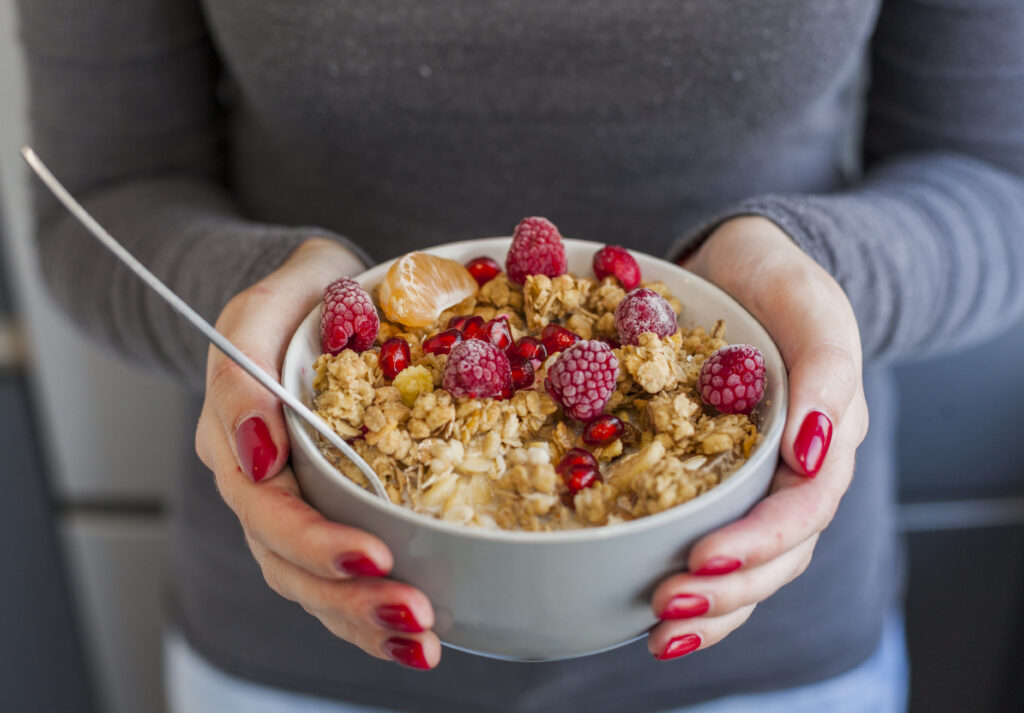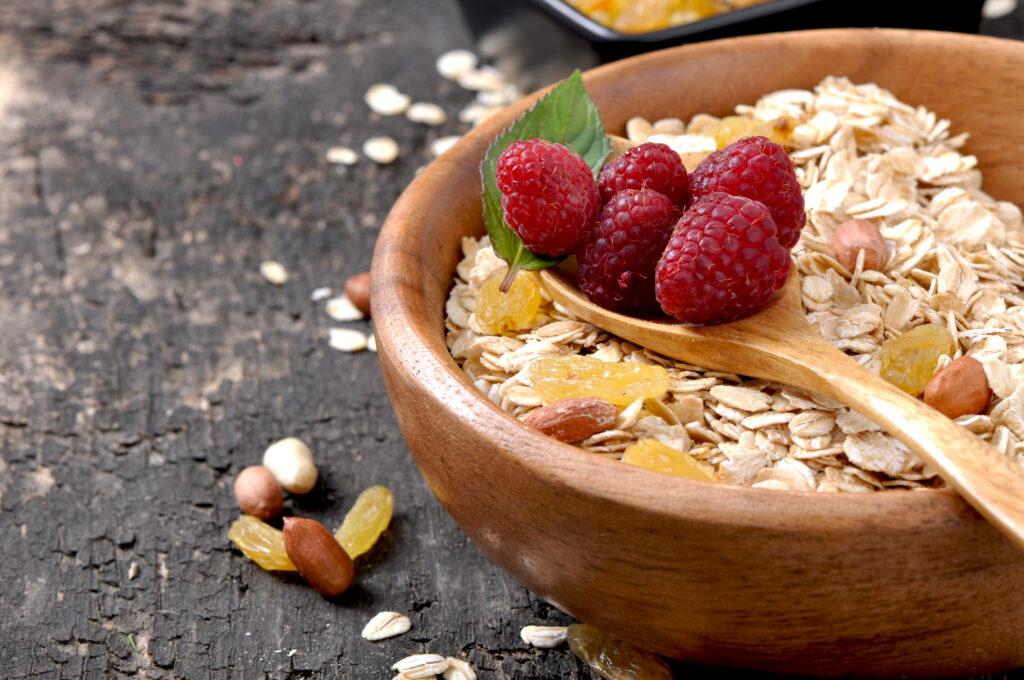Here we are going to share information on the topic “What are the 8 benefits of oatmeal?” Oatmeal has numerous health benefits that are supported by science. These include reduced blood sugar, a lower chance of heart disease, and weight loss.
A common breakfast item is oatmeal, which is made with oats and a liquid like water, plant-based milk, or cow’s milk. Nutritious and high in fiber, oats rank among the healthiest whole-grain foods available.
In this post, we outline oatmeal’s nutritional facts and possible health advantages. Among the advantages are:

What are the 8 benefits of oatmeal?
1. Supplying protective agents
There are a lot of antioxidants in oatmeal.
In particular, it has plant-based chemicals called polyphenols that are high in avenanthramides.
One class of antioxidant found nearly exclusively in oats is avenanthramides.
People can profit from avenanthramides by:
- Enhancing nitric acid synthesis, which can reduce blood pressure,
- Enhancing blood flow
- Lowering itching and inflammation
2. Improving blood sugar control and insulin response
- Beta-glucan, a soluble fiber found in oatmeal, has the potential to both lower blood sugar and enhance insulin responsiveness.
- As long as they don’t add more sugar to the dish, people with type 2 diabetes may discover that eating oatmeal helps them control their blood sugar levels.
- Oatmeal helps people with type 2 diabetes maintain their blood sugar levels, according to a review of studies on the subject.
- The safety of oatmeal for those with type 1 diabetes needs to be further investigated, according to the authors.
3. Providing an abundance of vitamins and minerals
Due to its low calorie content, oatmeal is a nutrient-rich food that is packed with many vitamins and minerals. Eating foods high in nutrients but low in calories can help someone lose weight or keep it off while getting the nutrients they need. Vitamins B-1 and B-5 are found in oatmeal.
Oatmeal includes:
- Magnesium and iron
- Potassium
- Zinc
- Folate
- Copper
- Vitamins B-1 and B-5
4. Raising cholesterol.
- Oatmeal can lower total cholesterol levels if people consume 3 grams (g) or more of beta-glucan per day.
- The research found that beta-glucan decreased low-density lipoprotein cholesterol, or “bad cholesterol,” but had no effect on high-density lipoprotein cholesterol, or “good cholesterol.”
- This suggests that oatmeal can support healthy cholesterol levels due to its beta-glucan content.
5. Encouraging beneficial microorganisms in the digestive system
- When oatmeal’s beta-glucan and water combine, a gel-like substance is created. The digestive tract and stomach are coated with this fluid.
- The coating promotes the growth of beneficial bacteria in the gut and helps maintain gut health by feeding them.
- A brief investigation of oatmeal’s impact on bacterial growth revealed that it might be beneficial.
6. Managing weight
- Due to its high soluble fiber content, oatmeal makes people feel fuller faster than they do after consuming other foods.
- This can help people lose weight by enabling them to eat fewer portions and feel fuller longer.
- An investigation into the impact of oatmeal on appetite revealed that it increased feelings of fullness and decreased the need to eat for the following four hours.
7. Lowering the likelihood of asthma
One common illness that frequently starts in childhood is asthma. Certain foods may increase the chance of having asthma, according to some studies, while other foods may have the opposite effect.
For instance, oats were found to be one of the first foods eaten by 3,781 children in research, and those children had a lower risk of developing asthma by the time they were 5 years old.
Additional foods that could lower the risk include:
- Fish eggs
- Wheat
- Rye
- Barley cereals.
8. Relieving the urge to void
- Almost everyone has had constipation at some point, as it is a common gastrointestinal issue.
- Constipation may be relieved or avoided by the fiber in oatmeal, which helps keep waste in the digestive system flowing.
Nutrition
Oatmeal contains a number of important minerals.
As per the US Department of Agriculture (Reliable Source), a single cup of cooked oats comprises:
- 166 energy
- 5.94 grams of protein
- 4.00 g of fiber from food
- 3.56 grams of fat
How to prepare oatmeal
There are various types of oatmeal available, such as:
- Steel-cut
- crushed
- rolled oat groat
Since oat groats are made up of whole oats, they take the longest to cook. Preparing rolled, crushed, and steel-cut oats takes less time.
Boiling the oats in water, plant-based milk, or cow’s milk will make oatmeal, unless the package specifies otherwise. There is a wide range of cooking times, from 10 to 60 minutes.
The directions on the package should be followed when cooking oats. Typically, the steps will entail:
- Heating up 1.5 cups milk or water to a boil, stirring in 1/2 cup oats, and then lowering the heat to medium
- Simmer steel-cut, crushed, or rolled oats for 10 to 20 minutes.
- Simmering oat groats for 50 to 60 minutes while adding optional extras like spices or sugars
- Instant oatmeal variants are the most processed, despite the fact that they often cook relatively rapidly. Instant oatmeal frequently has preservatives and sugar added.
Frequently Asked Questions
What are the 8 benefits of oatmeal?
What is oatmeal’s greatest advantage?
Answer: Antioxidants known as avenanthramides, which are absent from other cereal grains, are abundant in oats. By lowering inflammation and relaxing arteries, these antioxidants enhance heart health. Some oats’ soluble fiber helps prevent blood sugar spikes following meals.
Is eating oatmeal every day a good idea?
Answer: The high fiber content and prebiotic properties of oatmeal may have multiple health benefits for your body. Including oatmeal in your diet on a daily basis may help improve gut health, reduce the risk of disease, facilitate bowel movements, and prolong feelings of fullness.
Is eating oatmeal with milk every day a good idea?
Answer: Nutrient-dense foods like milk and oats support heart health. Beta-glucan, which is abundant in oats, has the ability to raise HDL (“good”) cholesterol and decrease LDL (“bad”) cholesterol. For heart health, calcium, potassium, and vitamin D are all found in milk, especially in fortified varieties.
What benefits and drawbacks come with consuming oats?
Answer: Oats are frequently regarded as the healthiest meal choice. It is the perfect dietary choice for anyone attempting to lose weight because it is full of nutrients, including fiber. It is also beneficial to eat oats if you have diabetes. However, because excessive oat consumption might have negative effects, specialists frequently advise against it.
How many servings of oatmeal do you have a day?
Answer: Eating just one serving of oats a day can potentially prevent diabetes because the normal serving size is 40 grams, or ½ cup. Lastly, fiber is essential for maintaining regularity and avoiding constipation, and oats are a wonderful source of it.
When is the best time to eat oatmeal?
Answer: The Best Time to Eat Oats Find out how it helps! Oats can be eaten at lunch or dinner as well. The majority of the time, though, they are consumed for breakfast. Oats contain fiber, magnesium, complex carbohydrates, and other nutrients that help keep your stomach full for longer, which helps prevent overeating.

Conclusion
What are the 8 benefits of oatmeal?
To sum up, oatmeal is a nutritious powerhouse that offers a host of advantages for both physical and mental health. Oatmeal is a versatile and easily attainable supplement to any diet because of its heart-healthy qualities, as well as its capacity to help with blood sugar regulation, promote digestive health, and assist in weight management. Its abundant food profile—which includes fiber, vitamins, and minerals—helps to improve satiety and maintain energy levels throughout the day. Furthermore, its importance as a cornerstone of a balanced diet is highlighted by its capacity to lower the risk of chronic diseases and boost immune system performance generally.
For those looking to put their health and fitness first, oatmeal is a simple yet effective option because of its cost, versatility, and simplicity. Accepting the many advantages of oatmeal not only encourages a healthy way of living but also provides a tasty and filling base for wholesome meals. Oatmeal is a valuable addition to any diet plan or cooking repertoire because including it in your daily routine can lead to long-term health advantages.
So, this is how the topic “What are the 8 benefits of oatmeal?” has been addressed.
For more information related to these topics,
You may also visit our Instagram page by
Thank you!

